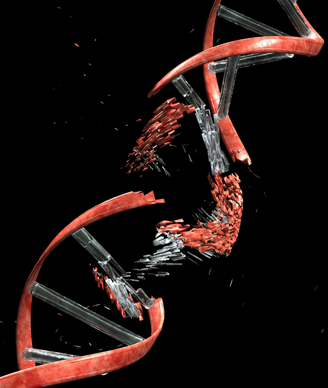DNMT3A Mutation Related to Poor-Risk AML
Patients with acute myeloid leukemia who had a DNMT3A mutation had poorer disease prognosis, according to an analysis of patients aged 60 years or younger.
Image © Constantin Ciprian / Shutterstock.com

Patients with acute myeloid leukemia (AML) who had a DNMT3A mutation had poorer disease prognosis, according to an analysis of patients aged 60 years or younger published recently in the Journal of Clinical Oncology.
Presence of this mutation was associated with a greater likelihood of disease relapse and a poorer overall survival; however, researchers led by Rosemary E. Gale, PhD, University College London Cancer Institute, noted that the difference in prognosis was only found when results were analyzed separately by NPM1 genotype, an example of Simpson’s paradox.
The study looked at samples taken from 914 patients with cytogenetic intermediate-risk AML. Samples were screening for DNMT3A mutations at exons 13 to 23. DNMT3A mutations were found in 30% of patients. Eighty percent of patients with DNMT3A mutations also had a NPM1 mutation.
“It results from the strong association between DNMT3A and NPM1 mutations and the opposing prognostic impact of the two mutants,” Gale and colleagues wrote. “In our cohort, 80% of DNMT3AMUT patients were also NPM1MUT, which leads to a marked inequality in the proportion of DNMT3AMUT in the NPM1MUT and NPM1WT patients. Because outcome of the total group reflects the relative proportion of the different genotypic subgroups, the effect that is seen separately in the groups is masked when data from the two groups are combined.”
In their stratified analysis, the researchers found that patients with DNMT3A mutation had a higher rate of relapse (hazard ratio [HR] = 1.35; 95% CI, 1.07-1.72; P = .01) and a lower overall survival (HR = 1.37; 95% CI, 1.12-1.87; P = .002). Patients with a DNMT3A mutation were significantly more likely to be older, to be female and have a higher presenting white blood cell count.
The researchers also looked at outcomes according to the type of DNMT3A mutation and found that outcomes were comparable among patients with R882 (n = 123) and non-R882 (n = 49) missense mutations. Patients with truncation mutations had comparable outcomes to those patients with DNMT3AWT.
“From a therapeutic viewpoint, our data confirm that DNMT3AMUT should be treated as a poor-risk factor,” the researchers wrote. “This is of particular relevance to management of patients currently considered as favorable risk, in particular those with CEBPADM, where DNMT3AMUT patients were significantly more likely to experience relapse, and those with NPM1MUTFLT3ITD-WT, where the lack of heterogeneity between subgroups indicated that these patients should not be considered differently from the other NPM1/FLT3 genotype groups.”
2 Commerce Drive
Cranbury, NJ 08512
All rights reserved.